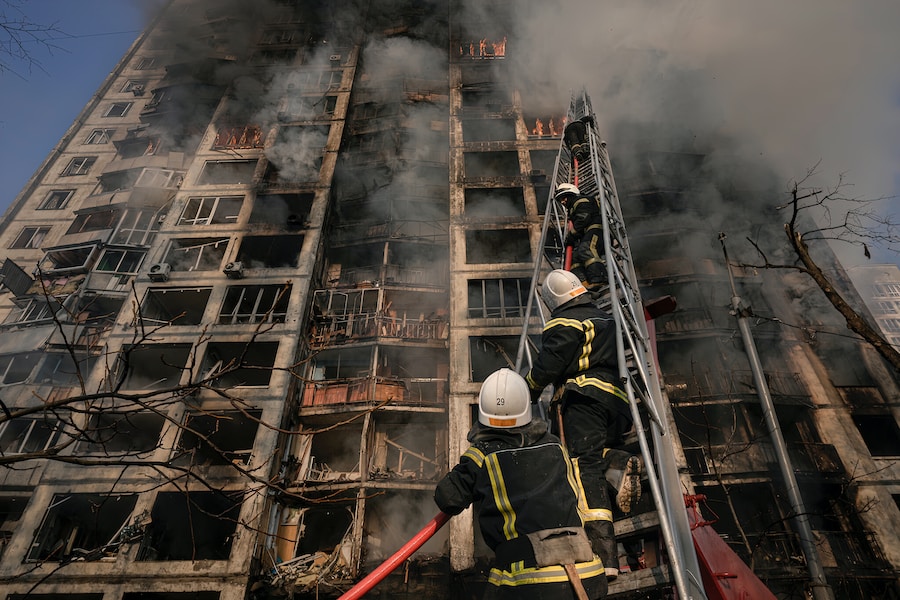The Ultimate Guide to Understanding Fire Insurance Policies
Fire insurance policies are a crucial aspect of protecting your property and belongings from the devastating effects of fire. In the event of a fire, these policies provide financial coverage for property damage, personal belongings, and additional living expenses. It is essential to understand the different types of fire insurance policies available, the coverage they offer, and the factors that can affect your premiums. By choosing the right fire insurance policy and taking necessary fire safety measures, you can safeguard your home or business from potential fire damage.
Key Takeaways
- Fire insurance is important to protect your property from damage caused by fire.
- There are different types of fire insurance policies available, each with varying coverage and premiums.
- Factors such as location, building materials, and fire safety measures can affect your fire insurance premiums.
- When choosing a fire insurance policy, it’s important to consider your specific needs and the exclusions in the policy.
- To prevent fire damage, take measures such as installing smoke detectors, having fire extinguishers on hand, and regularly maintaining electrical systems.
What is Fire Insurance and Why Do You Need It?
Fire insurance is a type of property insurance that provides coverage for losses and damages caused by fire. It is designed to protect homeowners, renters, and businesses from the financial burden of rebuilding or repairing their property in the aftermath of a fire. Fire insurance policies typically cover the cost of repairing or rebuilding structures, replacing damaged personal belongings, and covering additional living expenses if the insured property becomes uninhabitable.
Having fire insurance is crucial because fires can occur unexpectedly and cause significant damage. A fire can destroy not only your property but also your valuable possessions and sentimental items. Without insurance, you would be responsible for bearing the entire cost of rebuilding or repairing your property, which can be financially devastating. Fire insurance provides peace of mind by ensuring that you have financial protection in case of a fire-related disaster.
Types of Fire Insurance Policies Available
There are several types of fire insurance policies available to cater to different needs and budgets. The three main types are standard fire insurance policy, comprehensive fire insurance policy, and named perils fire insurance policy.
A standard fire insurance policy provides coverage for damages caused by fire, lightning, explosion, and implosion. It is the most basic form of fire insurance and covers only specific perils mentioned in the policy.
A comprehensive fire insurance policy offers broader coverage than a standard policy. It includes coverage for damages caused by additional perils such as riots, strikes, malicious damage, storm, flood, earthquake, and impact damage. This type of policy provides more comprehensive protection against a wide range of risks.
A named perils fire insurance policy is a more specific type of policy that covers only the perils explicitly listed in the policy. It offers coverage for damages caused by specific perils like fire, lightning, explosion, and implosion. This type of policy is suitable for those who want coverage for specific risks and are willing to accept the limitations of the policy.
Understanding the Coverage of Fire Insurance Policies
| Metrics | Description |
|---|---|
| Policy Coverage | The extent of protection provided by the fire insurance policy. |
| Premiums | The amount of money paid by the policyholder to the insurer for the coverage. |
| Deductibles | The amount of money that the policyholder must pay out of pocket before the insurer pays for the damages. |
| Exclusions | The situations or events that are not covered by the fire insurance policy. |
| Policy Limits | The maximum amount of money that the insurer will pay for the damages caused by fire. |
| Claim Process | The steps that the policyholder must follow to file a claim and receive compensation for the damages. |
Fire insurance policies provide coverage for various aspects of fire damage. Understanding the coverage offered by these policies is essential to ensure that you have adequate protection.
Coverage for property damage includes the cost of repairing or rebuilding structures that have been damaged or destroyed by fire. This includes not only the main building but also any attached structures such as garages or sheds. The policy may also cover other property elements like fences, driveways, and landscaping.
Coverage for personal belongings includes the cost of replacing or repairing damaged or destroyed items inside the insured property. This can include furniture, appliances, electronics, clothing, jewelry, and other personal possessions. It is important to keep an inventory of your belongings and their estimated value to ensure accurate compensation in case of a fire.
Coverage for additional living expenses is provided when the insured property becomes uninhabitable due to fire damage. This coverage helps cover the cost of temporary accommodation, meals, and other necessary expenses while your home is being repaired or rebuilt.
Factors Affecting Fire Insurance Premiums

Several factors can affect the premiums you pay for fire insurance. Insurance companies consider these factors when determining the risk associated with insuring your property.
Location plays a significant role in determining fire insurance premiums. Properties located in areas prone to wildfires or with limited access to fire departments may have higher premiums due to increased risk.
The type of property also affects premiums. Older properties or those with outdated electrical systems may be considered higher risk and result in higher premiums. Additionally, properties with a history of fire damage or claims may also face higher premiums.
Fire protection measures implemented in the property can impact premiums. Properties equipped with fire sprinkler systems, smoke detectors, fire extinguishers, and other fire safety equipment may qualify for lower premiums as they reduce the risk of extensive fire damage.
Deductibles are another factor that affects fire insurance premiums. A deductible is the amount you must pay out of pocket before the insurance coverage kicks in. Higher deductibles typically result in lower premiums, but it is important to consider your financial ability to cover the deductible in case of a fire.
How to Choose the Right Fire Insurance Policy for Your Needs
Choosing the right fire insurance policy requires careful assessment of your property and belongings, determining the coverage you need, and comparing policies and premiums.
Start by assessing your property and belongings to determine their value and potential risks. Consider factors such as the age of the property, its location, and any unique features that may affect its vulnerability to fire damage. This assessment will help you understand the level of coverage you require.
Next, determine the coverage you need based on your assessment. Consider the value of your property, personal belongings, and any additional living expenses you may incur if your property becomes uninhabitable. It is important to ensure that your policy provides adequate coverage for all these aspects.
Once you have determined your coverage needs, compare policies and premiums from different insurance providers. Look for reputable insurance companies that offer comprehensive coverage at competitive rates. Consider factors such as customer reviews, claim settlement history, and customer service when making your decision.
Common Exclusions in Fire Insurance Policies
While fire insurance policies provide essential coverage, there are certain exclusions that you should be aware of. These exclusions vary depending on the policy and insurance provider.
Acts of war or terrorism are typically excluded from fire insurance policies. Damages caused by these events are considered separate risks and may require additional coverage.
Negligence or intentional acts that result in fire damage may also be excluded from coverage. It is important to take necessary precautions to prevent fire accidents and ensure that your actions do not void your insurance coverage.
Flood or earthquake damage is often excluded from standard fire insurance policies. If you live in an area prone to these risks, you may need to consider additional coverage or a separate policy to protect against these perils.
What to Do in Case of Fire Damage
In the unfortunate event of a fire, it is crucial to prioritize safety and take immediate action to minimize further damage.
Ensure safety by evacuating all occupants from the property and calling emergency services. Do not attempt to extinguish the fire yourself unless it is safe to do so and you have been trained in firefighting techniques.
Contact emergency services such as the fire department and inform them about the situation. They will dispatch firefighters to extinguish the fire and ensure the safety of everyone involved.
Documenting the damage is essential for filing an insurance claim. Take photographs or videos of the affected areas, including any damaged structures, personal belongings, and other property elements. This documentation will serve as evidence for your claim and help ensure accurate compensation.
The Claims Process for Fire Insurance Policies
Filing a claim for fire insurance requires following a specific process to ensure a smooth and efficient settlement.
Start by contacting your insurance company as soon as possible after the fire incident. Provide them with all the necessary details, including the date, time, and location of the fire, as well as any relevant documentation or photographs.
The insurance company will assign an adjuster to assess the damage and determine the extent of coverage under your policy. The adjuster will inspect the property, review your documentation, and estimate the cost of repairs or replacement.
Once the assessment is complete, the insurance company will provide you with a settlement offer. This offer will outline the compensation you are entitled to based on the coverage provided by your policy.
If you agree with the settlement offer, you can accept it and receive the compensation. If you disagree with the offer, you can negotiate with the insurance company or seek legal advice to ensure a fair settlement.
Tips for Filing a Successful Fire Insurance Claim
Filing a successful fire insurance claim requires careful documentation and accurate information.
Documenting the damage is crucial for a successful claim. Take photographs or videos of all affected areas, including both structural damage and damaged personal belongings. Keep receipts or proof of purchase for valuable items to support your claim.
Provide accurate information to your insurance company when filing the claim. Be honest and transparent about the circumstances surrounding the fire and provide all necessary details requested by the insurance company. Providing inaccurate or incomplete information can lead to delays or denial of your claim.
Follow up with the insurance company throughout the claims process. Stay in regular communication with your claims adjuster and provide any additional documentation or information they may require. This proactive approach will help expedite the settlement process and ensure that your claim is processed efficiently.
How to Prevent Fire Damage in Your Home or Business
Preventing fire damage is essential to protect your property and reduce the risk of fire-related accidents. Implementing preventive measures can significantly reduce the likelihood of a fire occurring.
Regular maintenance of electrical systems, heating systems, and other potential fire hazards is crucial. Schedule regular inspections and maintenance checks to identify any potential issues and address them promptly.
Install fire safety equipment such as smoke detectors, fire extinguishers, and sprinkler systems in your home or business. Ensure that these devices are regularly tested and maintained to ensure their effectiveness in case of a fire.
Proper storage of flammable materials is essential to prevent fire accidents. Store flammable liquids, gases, and other hazardous materials in designated areas away from potential ignition sources. Follow all safety guidelines and regulations when handling and storing these materials.
Fire Safety Measures to Take in Your Home or Business
In addition to preventive measures, implementing fire safety measures can help minimize the damage caused by a fire and ensure the safety of occupants.
Install smoke detectors in every room of your home or business. Test them regularly to ensure they are functioning correctly and replace batteries as needed. Smoke detectors provide early warning signs of a fire, allowing occupants to evacuate safely.
Keep fire extinguishers readily accessible in key areas of your property. Ensure that everyone knows how to use them effectively and provide training if necessary. Fire extinguishers can help contain small fires before they spread and cause significant damage.
Develop evacuation plans for your home or business. Identify escape routes, emergency exits, and meeting points outside the property. Conduct regular drills to ensure that everyone is familiar with the evacuation procedures and can evacuate safely in case of a fire.
Fire Insurance for Renters and Landlords
Fire insurance is not limited to homeowners; it is also essential for renters and landlords.
For renters, fire insurance provides coverage for personal belongings and additional living expenses in case of a fire. It is important for renters to have their own fire insurance policy as the landlord’s insurance typically only covers the structure of the building.
For landlords, fire insurance protects their investment by providing coverage for the structure of the building. It also provides liability coverage in case someone is injured on the property due to a fire-related incident.
Fire Insurance for Commercial Properties
Commercial properties also require fire insurance to protect against potential fire damage.
Types of coverage available for commercial properties include coverage for property damage, business interruption, liability, and equipment breakdown. These policies are tailored to meet the specific needs of businesses and provide comprehensive protection against fire-related risks.
Factors affecting premiums for commercial properties are similar to those for residential properties. Location, type of property, fire protection measures, and deductibles play a significant role in determining the cost of fire insurance for commercial properties.
In conclusion, fire insurance is a crucial aspect of protecting your property and belongings from the devastating effects of fire. It provides coverage for property damage, personal belongings, and additional living expenses in case of a fire-related incident. By understanding the different types of fire insurance policies available, the coverage they offer, and the factors that can affect your premiums, you can make an informed decision when choosing the right policy for your needs. Additionally, implementing fire safety measures and taking preventive actions can help minimize the risk of fire damage. Fire insurance provides peace of mind by ensuring that you have financial protection in case of a fire-related disaster.











